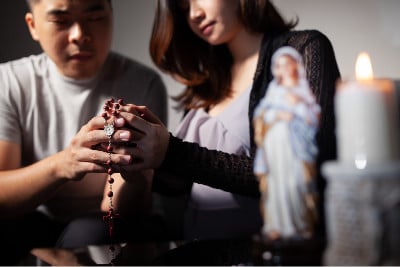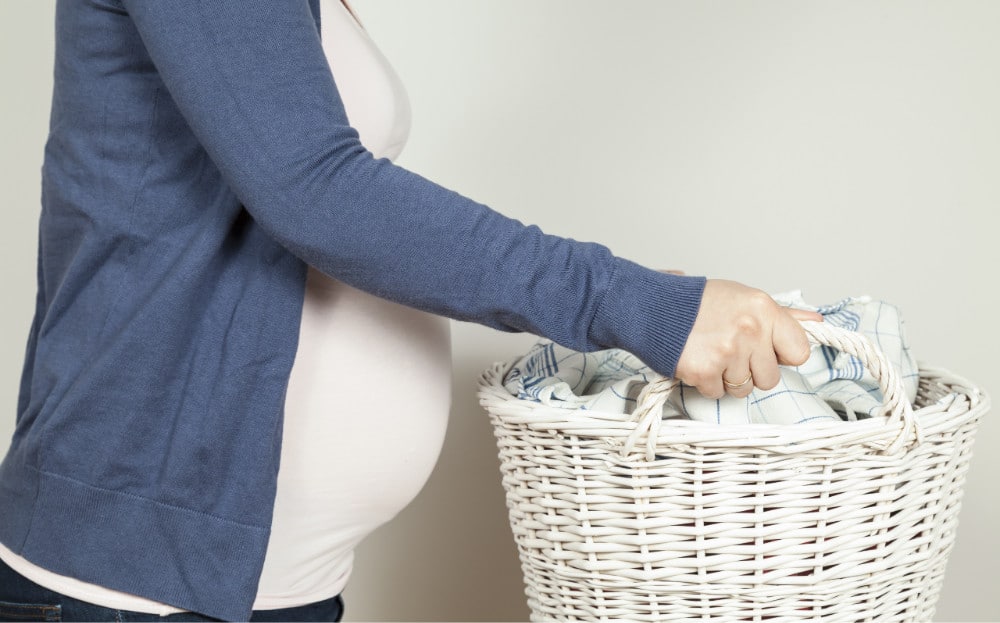“She’s pregnant with her fifth, too, and still training for a marathon.”
“She’s farther along than I am, and they’re still keeping up a rigorous home-school schedule.
“Why can’t I manage to keep the house as organized as she does?”
The temptation to compare myself to others was strong in the final weeks of pregnancy. I would scroll through Instagram and see women who were seemingly “doing” better than I was because they were doing more. It’s easy to equate worth with work, and it’s something that I find I have to actively fight against, both when I can accomplish a lot, but especially when I cannot.

Thankfully, my husband and I have gotten into the habit of praying night prayer together each evening before bed. It’s a peaceful ritual that helps us to connect at the end of the day, both with God and with each other. It’s also an opportunity for God to speak to each of us through his living word. And boy does he.
The concluding prayer on Mondays has always been a favorite of mine.
“Lord, / give our bodies restful sleep / and let the work we have done today / bear fruit in eternal life. / We ask this through Christ Our Lord. / Amen.”
I had been struggling recently, and though I have prayed them hundreds of times before, these words spoke to me in a new way that night. As I approached the end of my fifth pregnancy, the actual work I was accomplishing each day became less and less. The house was messier, the children were more likely to get away with wearing the same shirt three days in a row, and dinners were less planned than they were thrown together. It’s easy to get discouraged when you look around and see only what has been left undone.
But in the quiet of prayer, God spoke to me anew in these words. As we prayed the line, “let the work we have done today,” my husband put his hand on my stomach where our daughter was kicking. In a moment of grace, God enlightened my heart yet again and reminded me that his measure of work and worth is not the number of tasks accomplished.
Pope St. John Paul II so eloquently said: “Human persons are willed by God; they are imprinted with God’s image. Their dignity does not come from the work they do, but from the persons they are” (Centesimus Annus, No. 11). In that moment of prayer with my husband, I remembered that not just does my daughter have dignity and worth within my womb, but that I, too, have dignity, worth and value, even if all I can accomplish in a day is resting on the couch.
As Catholics, we believe that every life has value. The U.S. bishops’ pastoral plan for pro-life activities tells us: “As a gift from God, every human life is sacred from conception to natural death. The life and dignity of every person must be respected and protected at every stage and in every condition. The right to life is the first and most fundamental principle of human rights that leads Catholics to actively work for a world of greater respect for human life and greater commitment to justice and peace.” But sometimes, we forget that being pro-life is more than just protecting the souls in the womb; it also means honoring and respecting all members of society — ourselves included.
I personally struggle with this most during pregnancy, because it forces me into a position of needing help often. Needing help when I feel like I should be able to have everything under control or fulfill all of my responsibilities by myself is a very uncomfortable place to be, and it stretches my understanding of what it means to honor myself.
It’s during times like these I miss my Gram the most. She passed away last year, but before that, she had lived with our family for seven years. When she moved in with us, she was an active 92-year-old. She went to the senior center several times a week for mahjong and chair yoga, and, honestly, she had a better social life than I did.
But over the years, she declined slowly in ability, both physically and cognitively. Watching that happen up close was like receiving a masterclass in allowing grace to work. It was a hard-fought battle that she won — through accepting the reality of her decline, she taught me that allowing others to help isn’t a weakness. Today, I remember not just the gracefulness with which she surrendered but the blessings she brought our family, even when she couldn’t physically help.
She couldn’t fold clothes or cook dinner. She couldn’t vacuum or sweep or do chores. But she was an integral part of our family, and we struggled in her absence. Her worth, her value, was not in anything she did but simply in who she was. The elderly are often overlooked by virtue of what they can’t do, and we forget who they are. Gram living with us taught me the value of presence in a way that I don’t think anything else could have. Her ability to be 100% present to my children, to me, to listen and observe, even when I didn’t realize she was, was a powerful witness and a reminder of Christ’s calling to Mary and Martha.
Somedays the most I can manage is being present — I can sit on the couch and watch my kids play, I can listen to their stories, I can snuggle them when they are tired. And that is a beautiful thing. Much of my work as our baby reached her final stages in the womb was internal — invisible to all but God.
I am grateful to belong to a Church that teaches that the value of a person is inherent, based on being created in the image and likeness of God, not tied to achievements or jobs fulfilled. I’m grateful to belong to a Church that does not equate productivity with value, because, as our bishops have said, “For each person not only reflects God, but is the expression of God’s creative work and the meaning of Christ’s redemptive ministry” (“The Challenge of Peace,” No. 15).
It’s countercultural to believe that, and even more so to live it out. Pregnancy is always a time for me to lean into this truth with the hope that I can carry it into the other seasons of life so that I can be a better witness to my children and the world that all human beings are worthy of being loved, valued and respected, no matter what they can or cannot do.
Colleen Pressprich is the author of “The Women Doctors of the Church” (OSV, $16.95). She writes from Michigan.





